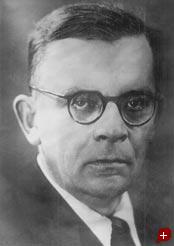

Books | Belles-Lettres
LINK to original document.
July 18, 2008

Hans Fallada |
On August 7, 1941, when the Russian campaign of the German army was barely two months old, and in that time between accommodation, resistance, and withdrawal into the apolitical, vacillating author Hans Fallada, in his idyllic home and place of withdrawal in Carwitz, Mecklenburg, wrote a story about the dispensable and the indispensable in wartime. It is presumed to be a commissioned piece. From letters, two periodicals appear to be plausible sources of the commission: either Das Signal [The Signal] or Das Reich [The Empire]. But the essay, About the Dispensable and the Indispensable, was not published, not then nor in any subsequent works of Fallada.
As recently as the 1960's, the narrative, in the form of a hand-written and a typed manuscript, appeared as part of Fallada's literary estate in Braunschweig. They were seen there by Guenter Caspar, an editor of the Aufbau Publishing Company. Thereafter, all traces of them disappeared, apparently having been passed to one of the heirs, and were not available for research. The hand-written manuscript has now resurfaced. On April 11th of this year, the Hans Fallada Society and the Hans Fallada Archive jointly purchased the hand-written manuscript at an auction held by the Berlin auction house Bassenge on behalf of an undisclosed seller, for 5,952 Euros. The price included the manuscript of his previously published story The Drowned Buddha [Der ertrunkene Buddha]. On Friday evening, as part of the 18th Hans Fallada Days in Carwitz, it was put on display. This minimally stylistically elaborated story carries with it a certain unique fascination. It is as if a wayward postcard from the war has finally been delivered to the addressees, the general public.
An idyllic conversation in the midst of a dangerous world, reminiscent of the setting of the Decameron, is romanticized: "On a peaceful summer night in the war year 1941, several men and women, sitting around a round white table at the shore of a wide lake, were engaged in a conversation. The conversation moves along pleasantly, prompted by one of the guests from Berlin who particularly enjoys the peaceful mood of the countryside, on the subject of shortages caused by the war. Each of the guests in turn unburdens him- or herself on the subject of what he or she misses the most. The hostess begins the round: She misses her car which, before the war, enabled her, occasionally at least, to dispel her loneliness. The host admits that he "misses so many things that a listing of them would be endless." But, the thing he misses most is the enjoyment of meat.
A doctor tells of one of his female patients who is suffering over the shortage of silk stockings, while he himself misses his daily bath the most. An elderly, unmarried woman misses soap. Then, a painter chimes in and complains about the absence of light in the darkened cities: "Doesn't it strike you as bordering on fantasy that not even two years ago the cities sparkled with light?" A young girl would like to go out with young men again: "laughing, fooling around, flirting." Finally, a woman identified as Veronica, who had remained silent until then, speaks, "I miss just one thing, and that is my son, who is now fighting somewhere out there in the East." The hostess ends the conversation with the observation that, of all of them, only Veronica has got it right.
The autobiographical links in this story are especially noticeable. Stefan Knueppel, the director of the Fallada Museum, observes that there are more correspondences than just the one between the setting of the conversation and Carwitz. The meat-savoring guest is recognizable as none other than Fallada himself, whose wife, Anna Ditzen, known in real life as "Suse" appears in the story as the hostess with the same name, also had to give up her beloved car, a Ford V-8, at the outbreak of the war.
Erika Becker, the director of the Fallada Archive, is able to identify the remaining characters as well: Heinrich Heuser and Willi Burlage, a boyhood acquaintance, were the inspirations for the painter and the doctor, respectively. And from letters, a model for the character Veronika can be deduced: Anna Ditzen's sister had to endure the anxiety of a son on the eastern front.
What appears not quite understandable, however, is why the Carwitz people would adopt Caspar's interpretation that the narrative represents an exhortation to stick it out. In particular, Knueppel said that, to moralize about abstention in wartime is to "concur substantially with the wielders of power." However, it does not appear that this is the message of the text. In the end, the war, which has usurped not only the small things, but here even the important things, and worst of all the most important one, the son, is not in the least legitimized. It is only the losses which are weighed against each other. There is not a trace of enthusiasm for the early victories in the East. Soap, meat, and stockings — they're all weighed as more important than the fatherland.
The statement of the mother, the only one that is more or less true to the official line, that her son "fights for me and for everybody" appears as little more than a crumbling facade, especially since she immediately adds that she would give anything to have him at her side. In particular, the allegorical eulogy of the painter for the lost light is the purest counter argument. An ideal of peace is sketched: "How great was the affinity of the individual for mankind, what sense of community was created by those golden bridges thrown across by the light." It is in sharp contrast to the depressing milieu of the present: "Like evil conspirators, we slink silently through the darkness."
Text: F.A.Z.
Graphic material: dpa
©F.A.Z. Electronic Media GmbH 2001 - 2008